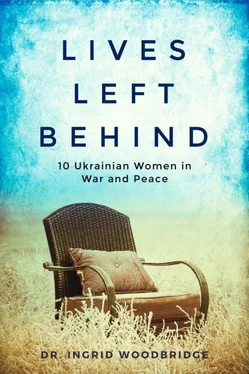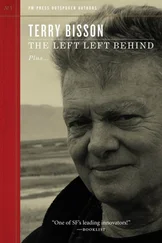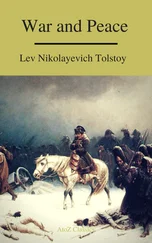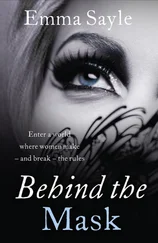Dima realized that it was time to leave Crimea for a while. The trauma of the invasion had been stressful for both the parents and the children. The day the referendum took place, the family left. They packed the kids into the car, took a few things with them, and evacuated. The whole escape trip was stressful; getting out of Crimea was challenging, and traveling with three small children was tiring, Marina remembered. They stayed briefly with friends in Odessa, but they did not know where to go next. They had left an unstable and uncertain life in Crimea, but they had taken very few personal belongings, still thinking that they would be able to return home in a few weeks. They never thought that they would not come back.
They decided to go to Vinnytsia, as they had friends there; they could stay for a while with them. Then they traveled to Ternopol, where some other wonderful friends hosted them. Sometime later, a Christian brother invited them to use his house, located just 30 km outside of L’viv. They decided to travel and see the house, having no other option. But the house was in disrepair; they could not live there. They found an apartment in the L’viv region and rented it for a month. They needed to evaluate their situation. They had so many questions: What to do? Where to go? Was a return to Crimea possible? Where would Dima find work? What about schooling for the boys? This was in June of 2014.
Marina said that her mother-in-law had actually invited them earlier to come and live with her in the Donbass region. But God directed Marina and Dima toward L’viv. Marina said that after the referendum in Crimea, similar things began to happen in Donbass. The war actually started in Donbass, and the events were more violent and terrible than the events in Crimea. Dima’s mom would send them photos via Viber, showing them what was going on. She would leave the area for a while, travel to Mariupol, work at the train station and try to wait it out. Many Russian troops arrived in the area of Donbass, and much technical war machinery was brought in. Donbass is now occupied territory.
By July 2014, Marina’s family had moved to L’viv and rented an apartment in the city. Dima had found work as a musician in L’viv and was performing with some other Christians in a band, playing at weddings and in cafes. The kids enrolled in the school system in L’viv, but struggled initially. In Crimea, all classes had been in Russian, with one class devoted to Ukrainian language. Now, all the academic instruction was in Ukrainian. Because of the language barrier, the kids struggled with making new friends, as everyone around them spoke only Ukrainian. But even in this, God blessed them, Marina said, because after only half a year in the school system, her boys understood Ukrainian better and started to make progress in school and in their friendships with other boys. The family received some humanitarian aid from an organization called “Crimea SOS”, that helped internally displaced people. They had just enough money for daily food and to pay the rent to their landlord.
Marina and her family started a new life in L’viv. Looking back, Marina said, the children did so well, and God kept everyone healthy on the journey west. Even Marina was able to find work in L’viv, taking care of an elderly lady as her companion and helper. Marina worked with this lady for three years and it supplemented the family’s income. While working for this woman, Marina shared her faith in God and even read the Bible to her. It was her own small evangelism project. She saw this work as more than just an opportunity to make money; it was also a ministry for her.
After the enormous stress of fleeing from Crimea, life became almost normal again. They were living a ‘new normal’ now, Marina said. The kids recovered from the ordeal, Dima and Marina had steady jobs to provide for the family’s needs, and school and work brought a much-appreciated rhythm to their lives again. God sent them much help, Marina reflected. People would drop off groceries, the children would receive fruit as a gift, and Dima was able to park his car in a parking garage without being charged a monthly fee. God really supported them in this trying time and helped them to find stability again after the upheaval they had been through.
Marina remembered one interesting visit of some Crimean Tatar friends to their new apartment in L’viv. The Tatar family definitely could not stay in Crimea, as persecution against this minority started almost immediately with the Russian occupation of Crimea. They were trying to move to Poland, but stopped in L’viv, and ended up living with Marina and Dima for two months. They came with their own children and a dog – it was a full house in the most literal sense imaginable. It was really a miraculous time, Marina said; finances were tight and the Tatar family could not contribute money to the household budget. Marina had to prepare food for all the household members. It was amazing how they got through this time. They were never cold, had always just enough to eat, and had a roof over their heads. Marina was glad to help others; her own exodus was so fresh in her memory.
Dima eventually decided that the family would stay permanently in L’viv. The kids showed great resilience and the parents learned from them about balancing life and regaining strength. Dima even did his driver’s license test in Ukrainian, which was really stressful for him. The family of five found a new rhythm and experienced quite a few miraculous provisions from God; the children adjusted quickly to life in L’viv. They succeeded at school, as well as in their language learning. They had lived through a traumatic experience and lost their home, said Marina, but God was so faithful. She reflected on the very stressful moves, sleeping in so many temporary places, trying to keep the kids happy, healthy, and entertained. Her own struggle with the crisis and the uncertainty of the future had taken an emotional toll as well.
Marina reminisced that Crimea would always be the place where she grew up, went to school, had family and friends. But she understood now that it was not her home anymore. So much had changed in Crimea that she could not go back. She could not live with her precious family in the occupied territory. Politically, there was constant propaganda that Ukraine would become one country again. Many of Marina’s friends stayed in Crimea, resigned to the occupation, learning to live with the new conditions. But Dima made it clear that he, as a musician and artist, could not live in such a controlled and confined region. The children still return to Crimea every summer for vacation, because they have close friends there. They have grandparents in Crimea and in Donetsk.
Visiting relatives in these occupied territories becomes more difficult every time they try. When Marina and the children traveled over the Ukrainian-Russian border into Crimea in the summer of 2018, they encountered problems and verbal abuse. The border guards gave them a hard time, questioning the boys about not living in Crimea, not having Russian passports. The children were intimidated and frightened. Marina had drilled them to say, “Please ask our mother; she will have answers for you.” Marina kept saying, “Keep calm, boys.” She kept praying that her children would not say anything offensive, leading to their arrest. Her boys did great, Marina said, and they helped her a lot with baby Emma (born 2018), who was going to meet her grandparents for the first time.
Marina’s parents don’t want to leave Crimea. Her father said, “I was born here, I will die here. I have a house here, I live here, I cannot leave, and I will not leave.” Her parents are encountering a lot of problems right now, Marina said. Russian law is in effect. For people who hold a Ukrainian passport in contrast to the favored Russian passport, life becomes harder as they encounter prejudices and trials. Marina said that she prays for her family a lot and witnesses to them about how greatly God has worked in her life and provided for them. Marina’s brother and his wife live with Marina’s parents. Her brother has no desire to leave Crimea. Dima wanted to travel to Donbas to see his family, but was not able to. Dima’s mom was able to visit them in L’viv three years ago.
Читать дальше












